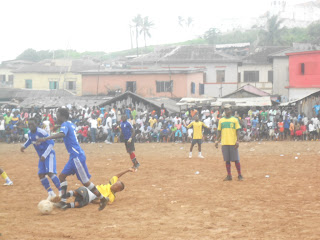Today is Friday, the final day of my stay in Ghana and I’m
soul-searching. What has been my motivation for spending and tipping freely,
giving gifts, for volunteering, in making on-going commitment to projects and
taking on personal cases?
If I’m honest with myself I admit I want to be liked. I’ve
long been approval-seeking and a people-pleaser. And it sure is easy to win
approval when you’re the one with cash to splash amongst people who are
scrambling to survive day to day.
It’s easy to play the Big Shot.
But coming into maturity I now realise that trying to be
liked by others is not necessarily the right motivation. I want to like myself.
Like all human beings, I have to live with myself and it feels good to be kind,
compassionate and generous. This is how I want to be; living every moment in my
core values.
I want to be a practical Christian, following the scriptural
teaching in Matthew 25 when Jesus instructed us to feed the hungry, give
water to the thirsty, give shelter to the homeless and clothes to the
shivering, help the sick and visit those in prison.
However sporadic handouts by well-meaning tourists like me
are not a lasting solution. We who live in the privileged part of the world
must assist those living in poverty to solve the problems of food production,
clean water, housing and infrastructure, education and employment in
sustainable ways.
Redressing the balance requires scrutinising the underlying
causes of inequality, facing the uncomfortable reality that our high standard
of living in developed countries comes at the expense of people in poor
countries, exploited by governments and corporations for their resources and
labour.
‘Sickness’ is a broad term covering emotional and mental
heartache and despair as much as physical illness and injury. Caring for the
sick means embracing the world as one family, accepting we are responsible for
mums and dads, brothers and sisters and children in other countries as much as
those in our own families and neighbourhoods.
I believe ‘imprisonment’ includes the entrapment of millions
of people globally who are robbed of their safety and freedom through abuse and
violations of human rights and the immoral business of war. ‘Visiting those in
prison’ means the recovery, rehabilitation and redemption of those traumatised
by war and abuse.
I believe in the power of compassionate people working
together to end war and abuse, poverty and social injustice.
So my three-week experience in Ghana has come to an end and
I cap off the trip with a delightful visit to Pastor Charles’ beloved mother.
Big brother Arnold collects me from the Paloma hotel and takes me to meet Ma
Anita, an inspirational, beautiful, intelligent lady.
A legendary cook, Ma Anita has made fresh chilled
watermelon, pineapple and mango juice, a scrumptious healthy salad, creamy
beans and the best deep fried plantain I’ve eaten in Ghana! We sit outside in
her tranquil tropical garden.
With her twinkling eyes and smooth skin, Ma looks much
younger than her 82 years. She is the dignified matriarch of a large
high-achieving family of two sons and two daughters and numerous grandchildren.
She raised her family on her own, putting her children through university by
working in insurance then turning to baking bread and running a store.
Well-travelled and well-read, Ma has a vast general
knowledge, sharp intellect and, I’m told, a lovely singing voice and she is
still active in her church where Arnold is pastor. It is a great honour to meet
her and Arnold and enjoy their company for a few hours on my final day here.
Ma shows me the family photo albums, we have an entertaining
skype call with Charles and Theresa and Ma gives me an exquisite Ashanti hand
woven shawl which I will treasure.
Meeting this well-educated, accomplished family has given me
another insight into Ghanaian society. Clearly, education is the key to
succeeding in any culture. Ma Anita gave her children that life-changing
opportunity and now her grandchildren are all university educated with
high-powered careers ahead of them and the strong desire to make a difference.
Hope for positive change lies with new generations of
clever, creative and compassionate young people.
Arnold and his lovely wife Elizabeth kindly battle peak hour
city traffic to drop me at the airport. We hug goodbye knowing we have bonded
as friends.
So here I sit in the departure lounge, waiting to board the
10.45 pm overnight flight with British Airways that will whisk me back to my
regular life in a three-storey terrace in West Ealing on the Piccadilly Line.
I suspect I will experience culture shock in reverse as I
re-enter normality. My values have been subjected to a major tweaking. I know I
will be less consumeristic and less complaining, more appreciative of my
privileged lifestyle, education and job opportunities, creature comforts, good
toilets, electricity, air conditioning, safe water and nutritious food, and
more grateful than ever for my loving, supportive family and friends.
I have directly touched the lives of hundreds of Ghanaians
and they have deeply touched my heart. I have given a few little tokens but
received immeasurably more intangible gifts of the heart I will cherish
forever.
I will honour my promises to those whose dreams I now carry
beyond the constraints imposed by poverty into the developed world of
opportunities. And I will continue to strive to make a difference for my new
friends, their families and communities.






































